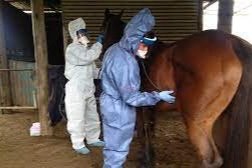What is Hendra Virus?
Hendra Virus is an RNA virus that exists in flying fox reservoirs. This virus has the potential to infect horses through transmission from bats, and once infected it has a high mortality rate and the potential to infect humans.
Up until June this year, all of the cases had been confined to Queensland and Northern NSW, however the positive diagnosis of a horse in the Hunter Valley shows that the virus is being carried further and wider, and will continue to do so with the increased stressors being placed on flying fox ecosystems.
Hendra Virus and horses
Unfortunately in horses, Hendra can cause a very diverse range of clinical signs, which makes it very hard for us to make clinical decisions on an unvaccinated horse without first doing a blood test to exclude Hendra. Although the disease is often characterised by a rapid onset of illness, horses may be infected and shedding the virus for up to 5 days prior to showing any clinical signs.
A lot of the symptoms displayed with Hendra are also seen with common respiratory, neurological or colic conditions also, which can mean if your horse is unvaccinated and has a simple medical condition which we can treat, treatment can be delayed whilst we are awaiting blood testing.
Suspicious symptoms in any unvaccinated horse include:
Rapid onset of illness and deterioration
Fever
Increased heart and respiratory rates
Nasal discharges and coughing
Discomfort and weight shifting
Rolling and sweating with no gut sounds
Any neurological signs including circling,
stumbling, head tilt, loss of vision, inability to rise
Sudden death
Hendra Virus and Humans
Hendra Virus is a zoonoses, which means that humans have been infected following contact with horses shedding the virus. Naturally, this risk is increased dramatically with exposure to nasal and oral secretions, blood and other bodily excretions without wearing appropriate personal protective equipment.
So far there has been no reported cases of Hendra transmission direct from flying foxes to humans.
Hendra Virus in humans has a very high fatality rate and there are no specific treatments available currently.
Hendra Vaccine
Zoetis created and launched a vaccine in 2012 in response to the increasing number of outbreaks and loss of human life. This vaccination has been registered with the Australian Pesticides and Veterinary Medicines Authority and protects horses and consequently humans by neutralising the virus upon exposure.
Ask Zoetis or call the clinic if you would like research, further information, or data on the number of horses vaccinated and reported incidents of reactions
Our Hendra Policy
While we have continued to attend and treat horses quite freely up until this stage, the positive case in the Hunter has really hit home with us as clinicians and members of our own families. We want to do what is best for everyone involved and ensure that we are continuing to attend horses as safely as we can, thus we have created a Hendra Protocol which we have outlined below.
We will continue to attend to most horses but please be aware that if your horse is unvaccinated and displaying any of the clinical signs outlined above we will need to take appropriate precautions and perform a Hendra exclusion test prior to doing any further invasive diagnostics or treatments, as this can greatly increase both yours and our risk of exposure to the virus.
We will wear, and supply you with appropriate personal protective equipment to obtain the samples necessary for the testing, however please note there will be additional costs associated with this. The cost of the testing itself is covered through District Surveillance, but it can take up to 48 hours for us to get a result.
Our Vets have undergone training from the DPI on entry and exit procedures and we will continue to work with and be guided by the DPI, Local Land Services and the Emergency Animal Disease group.
Please also note that if after speaking with you, we feel the risk of exposure for either yourself, the horse or ourselves is too high we do reserve the right to not attend to your horse.
Please do not hesitate to contact us on 6558 1504 to book in for vaccination or if you have any concerns regarding a horse in your care.
Further information on Hendra is available through the DPI.
If you cannot contact us directly and are suspicious of Hendra please call the Emergency Animal Disease Watch Hotline on 1800 675 888


